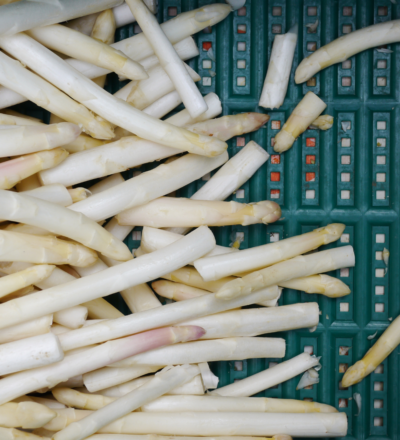While one-third of all food production goes to waste, food security remains a significant challenge. How can we increase food production without damaging the environment? By efficiently valorising food waste streams, we can maximise crop utilisation and effectively close the circle in our food production chain. In alignment with this goal, the innovative project Waste2Taste actively contributes to closing the cycle in food waste streams.
The Waste2Taste project, which came to an end in May 2023, utilised high-value vegetable waste to produce premium, fully natural food ingredients, in the form of dried products with extended shelf life. White asparagus has been identified as the ideal crop candidate for this project. The current extensive waste stream was used to develop new, innovative drying strategies.
Preserving flavour
Together with partners Teboza, Growers United, Unilever and Wageningen University and Research (WUR), we tackled the challenge of drying the ingredient while retaining the characteristic flavour and aroma. Two PhD students from WUR, Joanne Siccama and Eirini Pegiou, conducted research in food processing engineering and in metabolomics and food quality.
The processing strategies developed were evaluated for their general applicability to other vegetables. Spray drying in combination with a split-stream processing approach was successfully proposed and investigated for the production of asparagus powders with an improved flavour profile. Spray drying appeared to be well suited to efficiently retain most flavours due to its extremely fast drying time.
Advanced metabolomics
Sensory analysis showed that the spray-dried asparagus powder is a very interesting alternative to the conventional asparagus powders available, which often incorporate artificial flavouring. Advanced metabolomics analyses of raw materials, often combined with sensory evaluation, provide information of the composition of metabolites and flavour compounds in different asparagus varieties and in asparagus harvested throughout the season. Additionally, analyses identified the flavour compounds affected during concentration and further processing by drying, steering the process development.
This innovative spray drying process developed here is 5-10 times more energy-efficient than traditional freeze drying, which is often used to produce high quality powders. However, the most important energy saving is the potential to convert large amounts of vegetable by-streams (with an embodied energy of 1 GJ/tonne) into high-quality products using the proposed process.
Acknowledgement
This project is co-funded by TKI-E&I with the supplementary grant 'TKI- Toeslag' for Topconsortia for Knowledge and Innovation (TKI’s) of the Ministry of Economic Affairs and Climate Policy.
